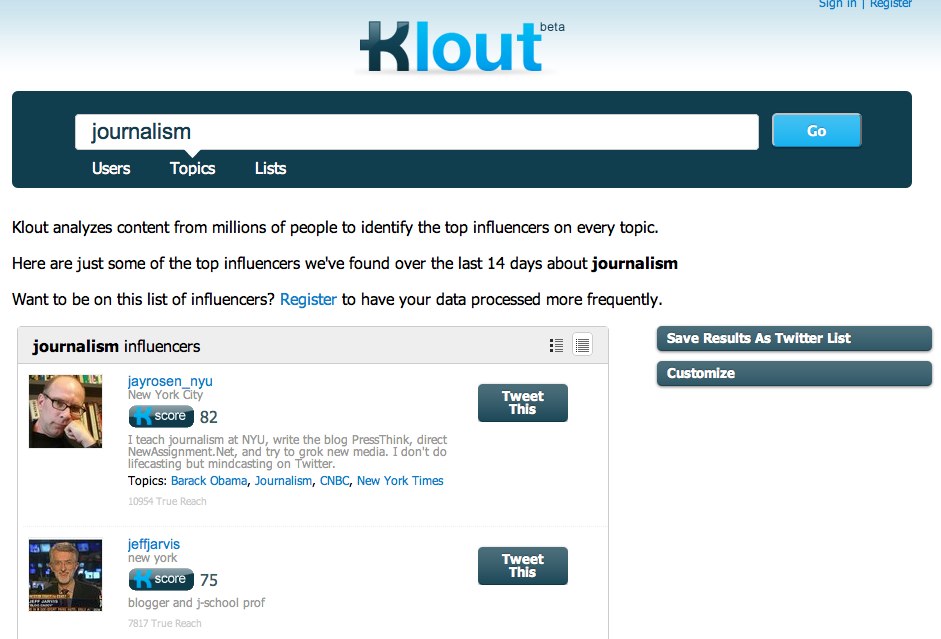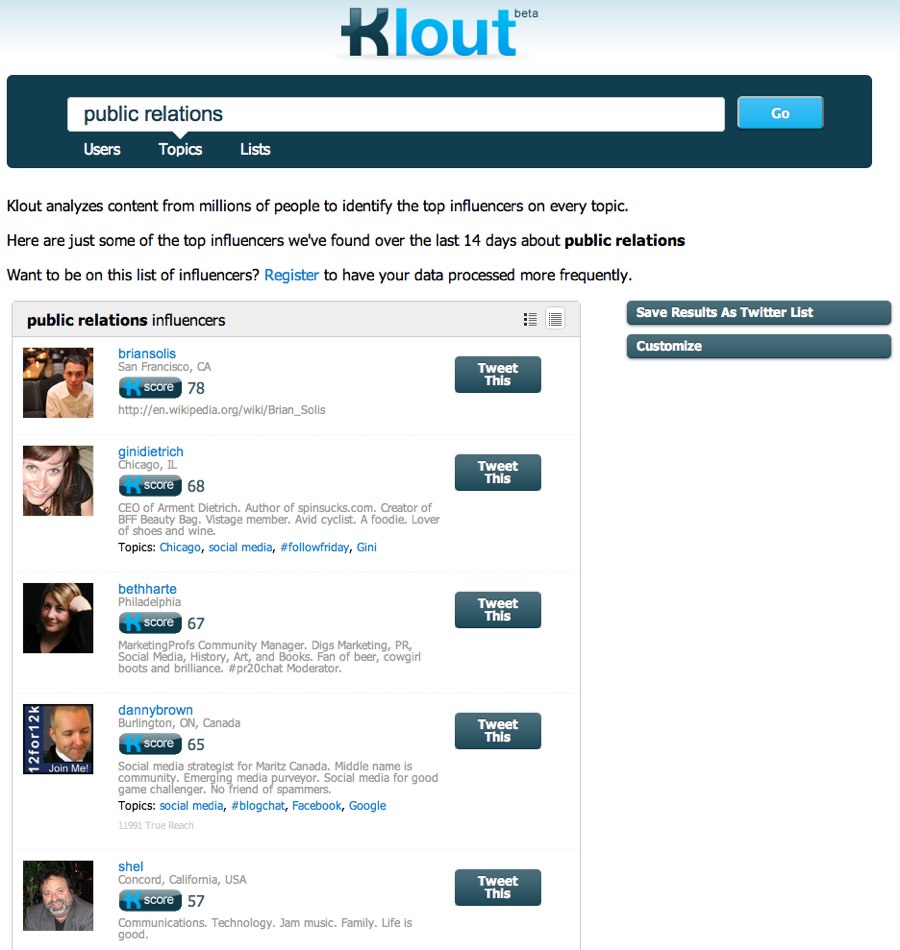
This is the uncut version of my latest post on TechCrunch…
Measuring individual influence in Social Media is as coveted as it is elusive. While many tools claim to calculate authority, it is the definition of influence that requires clarification in order to grasp the relevance and differences of existing tools and services.
For the sake keeping this discussion on track, let’s define influence. According to Merriam-Webster, influence is having the power or capacity to cause an effect.
San Francisco-based Klout is no stranger to measuring influence on the Social Web. The company launched at SXSW Interactive 2009 to help Twitter users discover the voices that the world listens to (on Twitter anyway). Essentially, Klout measures influence at the topical level, sorting individuals who demonstrate the ability to drive action within respective social graphs when discussing particular subjects.
Today, Klout is announcing its most significant release to date. In addition to measuring authority on Twitter, the company is releasing a new, intelligent Twitter List engine that identifies and ranks the top 25 influencers for any topic of interest and produces a new, qualified, and ranked list as a result.
For example, here’s list of the most influential people on the topic of journalism:

And, according to Klout, Public Relations:

Prior to the official release of Lists, Twitter provided Klout with early access to its List APIs. As such, Klout was able to immediately address one of the early frustrations with Lists – the ability to modify a list started by someone else without having to recreate it. The new system now adds the means to introduce any list into Klout’s analysis engine and instantly view the analytics of each person on each list. Users can then either follow that list as is or customize it using Klout’s topical search and ranking feature to ensure that the list is inclusive of all necessary authorities.
Klout’s ability to add context to a person’s influence is critical for businesses that want to leverage influencers in spreading the word about their companies or products.

Klout’s algorithm involves three sophisticated stages of semantic calculation. The first, described as “True Reach,” measures influence between each and every relationship, evaluating the engaged audience versus total audience.
The service also employs a secondary metric known as “Amplification Probability,” which documents the likelihood of a specific tweet spreading beyond the primary network through retweets as well as generating a response from the immediate audience. The service then examines the percentage of actual mentions or retweets shared by a particular audience as well as the percentage of the originating messages generated a user’s actions.
Finally, Klout factors the “Network Value,” which measures the influence of those individuals who follow the original user and their propensity for sharing their content, which contributes to overall authority.
Overall, Klout’s scores place a significant emphasis on the number of clicks a person drives through the links they share on Twitter, thus truly measuring action associated with each update.
Twitter Lists impact not only influence, but also create an opportunity for a new layer of earned authority. Whether or not you inspire measurable action directly, the creation of highly accurate and meaningful lists is significant and also helpful to the Twitter community. The ability to identify and assemble proven authorities on relevant subjects allow followers to stay connected to verifiable and trustworthy sources and the voices, information and trends that in turn influence their activity. More importantly, Klout empowers followers to further modify lists to not only track activity, but also determine opportunities for future engagement and behavior tracking.
After all, influence is not in the eye of the beholder, it is the ability to inspire action and also measure its effects.
Connect with Brian Solis on:
Twitter, FriendFeed, LinkedIn, Tumblr, Plaxo, Posterous, or Facebook
—
Click the image below to buy:
pr pr+2.0 pr2.0 public+relations marketing advertising interactive social+media socialmedia brian+solis social media media2.0 media+2.0 2.0 smo social+media+optimization marcom communication publicity advertising expert interactive spin brand branding guru social+architect







Great update from @brian solis advising how Klout can help us find Twitter-Influencers! Cool! #socialmedia
Updated feature on Klout makes Twitter lists more useful via @briansolis. Cool!
I think Klout is fascinating. Wicked algorithms like the ones that they've produced are monstrously impressive. As I mentioned earlier, while I'm not sure that ACTUAL influence can ever be accurately tracked, I think that their analysis gets closer than anyone else has thus far.
I'd love to find out more about how they determine influencers in any particular space. I've done a little experimenting into areas where, based on my own engagement, I know who key influencers are, but their scores aren't included in Klout's lists for those spaces.
So yes, very cool, very interesting. But still far from perfect (though pretty much everything is, right?) Thanks, Brian!
How does that algorithm compute the immense influence of a Buddha or a Wittgenstein on Twitter? Where is the distinction between a 'slow message' that takes centuries to be decoded, and a 'fast message' that is gone in a week?
So this gets to the heart of the twitter question- correlation vs. causation. Klout is an example of people that are influential BECAUSE of twitter or equally adept at using twitter as they are in their professional lives. What I'm interested in is a way to find influencers that aren't necessarily known as such in the twittersphere- but nonetheless are influential in their industries. If you'd like to collaborate on setting up a wiki or some such listing, ping me.
Ian, very interesting! We do a lot of that manually today, but I spoke with the Klout team to see what we could do for identifying influence outside of any one ream, as representative for a particular field or industry. There are some tools that do that today, but not at a quantifiable level (much in the way Klout looks at Twitter).
That's why I think a wiki format would be good for something like the project I have in mind. It's also not limited to Twitter- it's user-content-generated and tracks new media presences by vertical. So say you'd like to get a job in real estate and you've set up an online resume or blog. You want people of influence in that vertical to see you, and you want to approach them via non-traditional channels (for good reasons). Where are they? There are lists here and there, but nothing comprehensive. I'd like to see a single source that allows us to see multiple lists of influencers by industry, title, etc – tracking their profiles on new media. Obviously, this would be excellent for marketers, journalists, would-be authors, and anything with something to promote. An interactive guide to getting in front of heavy hitters, if you will.
There are a number of tools that do that nowadays, but not at a scientific stage.
Twitter makes it easy for users to follow people whose views they find interesting, but it also begs the question: does this person know what they’re talking about? It is essential in any social media forum to be able to trust the information you’re reading. Twitter posts are so brief that it’s hard to convey a full understanding of a topic. Tools like Klout provide a great service to people looking for credible information. Although the algorithm is extremely advanced, it’s difficult to measure some as intangible as credibility in a mathematical way. However, Klout is essentially measuring the audience’s reaction, which, if positive, is a pretty great indicator of success and credibility.
Audience reaction may or may not be a good indicator of someone's true abilities. I find Twitter is a popularity contest — not a measure of a person's track record or success in a particular field. Most of the people on these lists are very savvy at social media networking — and reciprocal favors and follows with other popular Twitter users. That doesn't necessarily mean I would want to hire them as consultants to advise me in my business. (Unless, of course, I wanted to become a Twitter superstar.)
In my first, perhaps naive, test with Klout on my favorite topic, the results didn't agree with my intuition or my perception of authority within our community. Be cautioned that Twitter-wide global influence may not translate to authority within a given group, even if you score on that keyword. More in my post: Influence is not authority. Keywords are not conversations.
I do think Twitter Lists are the key, somehow, to solve this.
John, excellent post. I think it is a must read…the title is powerful and says everything. I would also extend those thoughts by questioning whether or not Twitter represents “the conversation” at all…especially compared to FriendFeed and Facebook threads as well as blogs and comments where influential dialogue actually plays out.
This is a very interesting post. I think that websites like these could be a great tool for consumers and people to find information from someone they think they could trust. These influencers have the potential to be great resources and promoters; however, it is difficult to discern what would be popularity and what would be good information. Does Klout take that into mind? I don't know if that really matters, but it seems that if companies could get a hold of these lists, they could place products and find ways and promote through these influencers. Would this use defeat the point of these people being influential or is that part of the gig? I definitely think that John Troyer's point that influence is not necessarily authority is a great idea to keep in mind.
John, excellent post. I think it is a must read…the title is powerful and says everything. I would also extend those thoughts by questioning whether or not Twitter represents “the conversation” at all…especially compared to FriendFeed and Facebook threads as well as blogs and comments where influential dialogue actually plays out.
This is a very interesting post. I think that websites like these could be a great tool for consumers and people to find information from someone they think they could trust. These influencers have the potential to be great resources and promoters; however, it is difficult to discern what would be popularity and what would be good information. Does Klout take that into mind? I don't know if that really matters, but it seems that if companies could get a hold of these lists, they could place products and find ways and promote through these influencers. Would this use defeat the point of these people being influential or is that part of the gig? I definitely think that John Troyer's point that influence is not necessarily authority is a great idea to keep in mind.
I dont want to sumit it again if i do not have to!
Klout has changed a lot since then. You can no longer search by typing a topic. Only the topics you used to describe your niche that are listed in a drop down box.